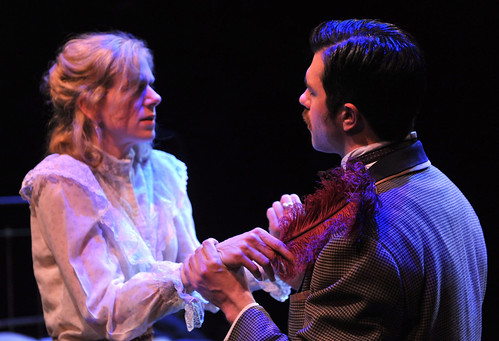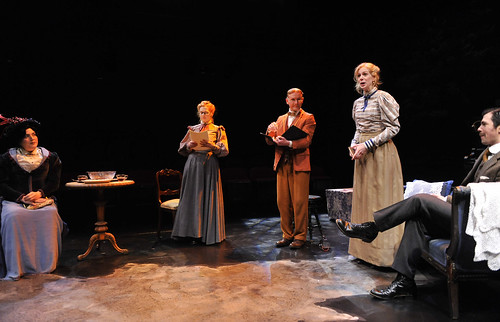Of pleasures and Eccentricities
Love hurts: Beth Wilmurt is Alma Winemiller and Thomas Gorrebeeck is John Buchanan in the Aurora Theatre Company production of Tennessee Williams' Eccentricities of a Nightingale. Below: Gorrebeeck's John (far right) watches as Wilmurt's Alma conducts a meeting with her fellow "misfits" (from left Leanne Borghesi, Beth Deitchman and Ryan Tasker). Photos by David Allen
Oh, Alma Winemiller. If you had been able to shuck off the burden of having an insane mother and a stern Episcopalian priest for a father, you might have become the woman you were meant to be: Lady Gaga.
OK, that's an exaggeration, but poor Alma is just a heap of talent and emotion and expression aching for release in Tennessee Williams' Eccentricities of a Nightingale, a play with a convoluted history in the Tennessee Williams canon. The Aurora Theatre Company production of the play, directed with finesse and warmth by Artistic Director Tom Ross, makes a case for the play being if not alongside siblings like A Streetcar Named Desire and Cat on a Hot Tin Roof, then at least in an honorable spot somewhere just below.
Eccentricities started out as a short story called "Yellow Bird," which evolved into the play Summer and Smoke. That play's Broadway premiere in 1948 failed to live up to expectations set by Streetcar, though a 1952 off-Broadway revival starring Geraldine Page salvaged the play's reputation somewhat (Page reprised the role of Alma in the 1961 movie).
Soon after writing Summer and Smoke, Williams had already created an alternate version of it, which he called Eccentricities of a Nightingale. He offered that one to the Broadway producers of Summer and Smoke, but they stuck with original play. Williams is said to have liked Eccentricities better: "It is less conventional and melodramatic." Even so, the alternate version didn't have its Broadway premiere until 1976.
The Aurora, with its wonderfully intimate playing space, is a great way to experience Williams. Being able to see the slightest shift in an actor's face, or to notice very specific physical movement, however small, makes it all very real and emotional. One of the chief pleasures of this Nightingale is experiencing – really experiencing – the beautiful performances by Ross' cast.
It's clear that Williams had a connection to and deep compassion for the character of Alma, a passionate, yearning woman forced by gender and convention into straitjacketed small-town life. She refuses, however, to surrender her individuality. That's why she's politely referred to as an eccentric. When she sings, she's too emotionally connected. She's too histrionic, too affected. But she's unlike anyone else in town, and that's a small triumph.
Beth Wilmurt has a little bit of Geraldine Page in her Alma, and that can only be a good thing. Wilmurt is an immediately likable and accessible actor. We feel for Alma right away when we meet her at a Fourth of July picnic. She's a spinster in the making (if not a spinster in the town's eyes already), someone to feel sorry for but not think about too often. Alma knows all that but embraces her eccentricity anyway – even when it provokes the disapproval of her father (a stern Charles Dean).
Wilmurt has the tremendous advantage of being funny and heartbreaking at the same time. We can see in her Alma's instability, which she may have inherited from her "disturbed" mother (Amy Crumpacker), who ambles about talking about her dead sister, Albertine, and the Musée Mécanique. We also see her father's resilience and, underneath it all, the soul of an artist who wants to taste the world.
With Thomas Gorrebeeck as young Dr. John Buchanan, it's easy to see why Alma has been in love with the boy next door since childhood. He broods without seeming like a self-indulgent narcissist, and though deemed a success in the world – summa cum laude from Johns Hopkins – he's got parental damage as well. He's a mama's boy in the extreme. His doting mother – played with crisp, almost creepy authority by Marcia Pizzo – wouldn't know an appropriate boundary if it was an electrified fence.
John still has a spark of individuality, though, and that spark lights up around Alma. Even though Mother Buchanan does everything she can to squash John's interest in the wholly inappropriate girl next door, he pays her some much needed attention.
There's an extraordinary scene – so well directed and performed you don't want it to end – that involves a panic attack, a late-night visit to the doctor's office and a powerful emotional flare-up. Wilmurt and Gorrebeeck bare the souls of their characters to such a degree that the play peaks in the scene. The following scene, in which Williams the love-as-fire metaphor into the ground, is anti-climactic (although Wilmurt continues to fascinate), and the epilogue is just sad, as it probably has to be. For a woman like Alma in the early part of the 20th century, there weren't a lot of good choices.
Simply and beautifully designed by Liliana Duque Piñeiro (sets), Jim Cave (lights) and Laura Hazlett (costumes), this Nightingale casts an emotional spell and makes you grateful that Williams kept coming back to Alma.
FOR MORE INFORMATION
Tennessee Williams' Eccentricities of a Nightingale continues through continues through May 8 at the Aurora Theatre Company, 2081 Addison St., Berkeley. Tickets are $34-$45. Call 510-843-4822 or visit www.auororatheatre.org.

